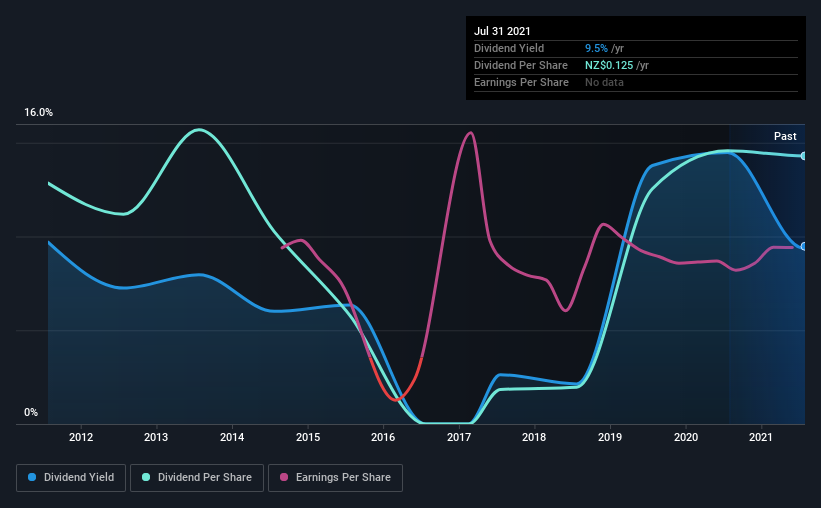Four Days Left To Buy Livestock Improvement Corporation Limited (NZSE:LIC) Before The Ex-Dividend Date
Livestock Improvement Corporation Limited (NZSE:LIC) is about to trade ex-dividend in the next 4 days. The ex-dividend date is one business day before a company's record date, which is the date on which the company determines which shareholders are entitled to receive a dividend. The ex-dividend date is important as the process of settlement involves two full business days. So if you miss that date, you would not show up on the company's books on the record date. Accordingly, Livestock Improvement investors that purchase the stock on or after the 5th of August will not receive the dividend, which will be paid on the 20th of August.
The company's next dividend payment will be NZ$0.13 per share, and in the last 12 months, the company paid a total of NZ$0.13 per share. Based on the last year's worth of payments, Livestock Improvement stock has a trailing yield of around 9.5% on the current share price of NZ$1.32. If you buy this business for its dividend, you should have an idea of whether Livestock Improvement's dividend is reliable and sustainable. So we need to investigate whether Livestock Improvement can afford its dividend, and if the dividend could grow.
See our latest analysis for Livestock Improvement
Dividends are typically paid out of company income, so if a company pays out more than it earned, its dividend is usually at a higher risk of being cut. Its dividend payout ratio is 76% of profit, which means the company is paying out a majority of its earnings. The relatively limited profit reinvestment could slow the rate of future earnings growth. We'd be worried about the risk of a drop in earnings. Yet cash flow is typically more important than profit for assessing dividend sustainability, so we should always check if the company generated enough cash to afford its dividend. It paid out more than half (62%) of its free cash flow in the past year, which is within an average range for most companies.
It's positive to see that Livestock Improvement's dividend is covered by both profits and cash flow, since this is generally a sign that the dividend is sustainable, and a lower payout ratio usually suggests a greater margin of safety before the dividend gets cut.
Click here to see how much of its profit Livestock Improvement paid out over the last 12 months.
Have Earnings And Dividends Been Growing?
Companies with consistently growing earnings per share generally make the best dividend stocks, as they usually find it easier to grow dividends per share. Investors love dividends, so if earnings fall and the dividend is reduced, expect a stock to be sold off heavily at the same time. With that in mind, we're encouraged by the steady growth at Livestock Improvement, with earnings per share up 4.0% on average over the last five years. A high payout ratio of 76% generally happens when a company can't find better uses for the cash. Combined with slim earnings growth in the past few years, Livestock Improvement could be signalling that its future growth prospects are thin.
The main way most investors will assess a company's dividend prospects is by checking the historical rate of dividend growth. Livestock Improvement has delivered an average of 1.1% per year annual increase in its dividend, based on the past 10 years of dividend payments.
Final Takeaway
From a dividend perspective, should investors buy or avoid Livestock Improvement? Earnings per share growth has been unremarkable, and while the company is paying out a majority of its earnings and cash flow in the form of dividends, the dividend payments don't appear excessive. In summary, it's hard to get excited about Livestock Improvement from a dividend perspective.
If you're not too concerned about Livestock Improvement's ability to pay dividends, you should still be mindful of some of the other risks that this business faces. For example, we've found 1 warning sign for Livestock Improvement that we recommend you consider before investing in the business.
If you're in the market for dividend stocks, we recommend checking our list of top dividend stocks with a greater than 2% yield and an upcoming dividend.
This article by Simply Wall St is general in nature. It does not constitute a recommendation to buy or sell any stock, and does not take account of your objectives, or your financial situation. We aim to bring you long-term focused analysis driven by fundamental data. Note that our analysis may not factor in the latest price-sensitive company announcements or qualitative material. Simply Wall St has no position in any stocks mentioned.
Have feedback on this article? Concerned about the content? Get in touch with us directly. Alternatively, email editorial-team (at) simplywallst.com.

 Yahoo Finance
Yahoo Finance 
